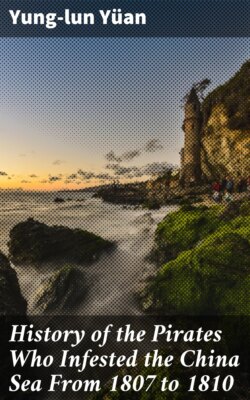Читать книгу History of the Pirates Who Infested the China Sea From 1807 to 1810 - Yung-lun Yüan - Страница 6
На сайте Литреса книга снята с продажи.
BOOK FIRST.
ОглавлениеTable of Contents
There have been pirates from the oldest(1 r.) times in the eastern sea of Canton; they arose and disappeared alternately, but never were they so formidable as in the years of Këa king,[26] at which time, being closely united together, it was indeed very difficult to destroy them. Their origin must be sought for in Annam.[27] In the year fifty-six of Këen lung (1792), a certain Kwang ping yuen, joined by his two brothers, Kwang e and Kwang kwŏ, took Annam by force,(1 v.) and expelled its legitimate king Wei ke le.[28] Le retired into the province Kwang se, and was made a general by our government. But his younger brother Fuh ying came in the sixth year of Këa king (1802) with an army from Siam and Laos,[29] and killed Kwang ping in a great battle. The son of the usurper, called King shing, went on board a ship with the minister Yew kin meih, and Meih joined the pirates, Ching tsih, Tung hae pa, and others, who rambled about these seas at this time. The pirate Ching tsih was appointed a king's officer, under the name of master of the stables. King shing, relying on the force of his new allies, which consisted of about two hundred vessels, manned(2 r.) with a resolute and warlike people, returned in the twelfth moon of the same year (1803) into that country with an armed force, and joined by Ching tsih, at night time took possession of the bay of Annam. The legitimate king Fuh ying collected an army, but being beaten repeatedly, he tried in vain to retire to Laos.
Ching tsih being a man who had lived all his life on the water, behaved himself, as soon as he got possession of the bay of Annam, in a tyrannical way to the inhabitants; he took what he liked, and, to say it in one word, his will alone was law. His followers conducted themselves in the same manner; trusting to their power and strength, they were cruel and violent against the people; they divided the whole population among themselves, and took their wives and daughters by force. The inhabitants felt very much annoyed at this behaviour, and attached themselves more strongly to Fuh ying. They fixed a day on which some of the king's officers should make an attack on the sea-side, while the king himself with his general was to fight the van of the enemy, the(2 v.) people to rise en masse, and to run to arms, in order that they should be overwhelming by their numbers. Fuh ying was delighted at these tidings, and on the appointed day a great battle was fought, in which Ching tsih not being able to superintend all from the rear-guard to the van, and the people pressing besides very hard towards the centre, he was totally vanquished and his army destroyed. He himself died of a wound which he received in the battle. His younger brother Ching yĭh, the usurper, King shing, and his nephew Pang shang, with many others ran away. Ching yĭh, their chief, joined the pirates with his followers, who in these times robbed and plundered on the ocean indiscriminately. This was a very prosperous period for the pirates. So long as Wang pëaou remained admiral in these seas, all was peace and quietness both on the ocean and the sea-shore. The admiral gained repeated victories over the bandits;(3 r.) but as soon as Wang pëaou died, the pirates divided themselves into different squadrons, which sailed under various colours. There existed six large squadrons, under different flags, the red, the yellow, the green, the blue, the black, and the white. These wasps of the ocean were called after their different commanders, Ching yĭh, Woo che tsing, Meih yew kin, O po tai, Lëang paou, and Le shang tsing. To every one of these large squadrons belonged smaller ones, commanded by a deputy. Woo che tsing, whose nick-name was Tung hae pa, the Scourge of the Eastern Sea,[30] was commander of the yellow flag, and Le tsung hoo his deputy. Meih yew kin and Nëaou shih, who for this reason was called Bird and stone, were the commanders of the blue flag, and their deputies Meih's brethren, Yew kwei and Yew këe. A certain Hae kang and another person Hwang ho, were employed as spies. O po tai, who afterwards changed his name to Lustre of instruction,[31] was(3 v.) the commander of the black flag, and Ping yung ta, Chang jih këaou, and O tsew he, were his deputies. Lëang paou, nicknamed Tsung ping paou, The jewel of the whole crew, was the commander of the white flag. Le shang tsing, nicknamed The frog's meal, was the commander of the green; and Ching yĭh of the red flag. Every flag was appointed to cruise in a particular channel. There was at this time a gang of robbers in the province Fo këen, known by the name of Kwei këen (6760, 5822); they also joined the pirates, who became so numerous that it was impossible to master them. We must in particular mention a certain Chang paou, a notorious character in after-times. Under Chang paou were other smaller squadrons, commanded by Suh ke lan (nicknamed Both odour and mountain) Lëang po paou, Suh puh gow, and others. Chang paou himself belonged to the squadron of Ching yĭh saou, or the wife of Ching yĭh,[32] so that the red flag alone was stronger than all the others united together.
